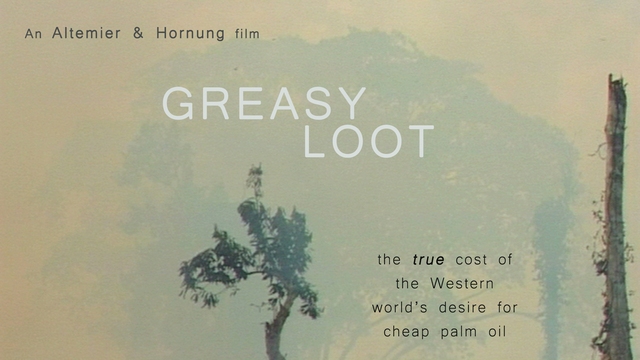Greasy Loot
A shocking exposé on the destruction of Indonesian rainforests for palm oil.
 Palm oil is an ingredient central to make-up, margarine and innumerable other products. It's a story of horrendous abuse, of torture, child labour and corruption at the highest level, revealing the true cost of the Western world's desire for cheap palm oil.
Winner of the Ökomedia Golden Lynx 2002 for best journalistic work.
Palm oil is an ingredient central to make-up, margarine and innumerable other products. It's a story of horrendous abuse, of torture, child labour and corruption at the highest level, revealing the true cost of the Western world's desire for cheap palm oil.
Winner of the Ökomedia Golden Lynx 2002 for best journalistic work.
Indonesia is the world's second largest producer of palm oil. The fruits of these trees are used to produce a variety of goods, ranging from margarine and sweets to cosmetics and animal feed. Worldwide consumption has doubled over the last 15 years. Demand is still increasing. Relentless consumption of these goods has fuelled an expansion in palm oil plantations in Indonesia; an expansion which is fed by the land of indigenous tribes and poor farmers.
A Shaman dances around a fire in a desperate attempt to appeal to the spirits for help. According to Indonesian law, the land belongs to the people who cultivate it. This has not prevented his tribe being mercilessly driven off their indigenous land by the owners of the palm plant plantation. "This was our land ... now we have no fields and nothing to live off", says a tribe member: "They are sucking the blood out of our bodies from head to toe."
The Indonesian government encourages the growth of plantations. Over 670.000 acres of forest - an area the size of Belgium - have been cleared for palm cultivation. Local officials are easily bribed by big corporations. Plantations have even sprung up on land designated for trees for paper mills.
The village of Empang Benao lost all its fields and forests. When villagers approached the plantation to negotiate compensation, police opened fire. Other protesters were imprisoned and tortured. "They beat me unconscious with the butt of the gun", recalls a dispossessed farmer. Families of those imprisoned are left without any source of income. "We desperately need help ... Since our husbands have been jailed and the bread-winners are gone we have become beggars." They can't afford to send their children to school and so they too are forced to work on the plantations.
A river bubbles with brown, stagnant water. Phosphates in fertilisers used on the plantations have killed all life. Dr Herbert Baungartner, spokesman for the backers of the plantation, claims the plantations are "ecologically sound" and "contribute to the development of Indonesia". However, the rape of the forests still continues. Lush rainforest is illegally cleared with fire and workers are forced to use highly toxic pesticides without any protection. Where once there was bountiful forests, palm trees stretch as far as the eye can see.
The economic viability of these plants has also been called into question. Billions of dollars of credits from the Sinar Mas plantation are missing. Shares in this company are no longer traded on the stock market and, in Singapore, a state prosecutor has started a fraud investigation. Nevertheless, money is still poured into the company in the form of state loans, World Bank programmes and tax dollars.
Time is running out for the villagers. Global hunger for cheap cosmetics and low cost sweets means business and government hunger for the profits. As ever, the power of the mighty dollar tramples on the little man. Until these companies abandoned their unethical policies, the people of Indonesia will continue to suffer.
Produced by ALTEMEIER & HORNUNG FILMPRODUKTION
FULL SYNOPSIS

